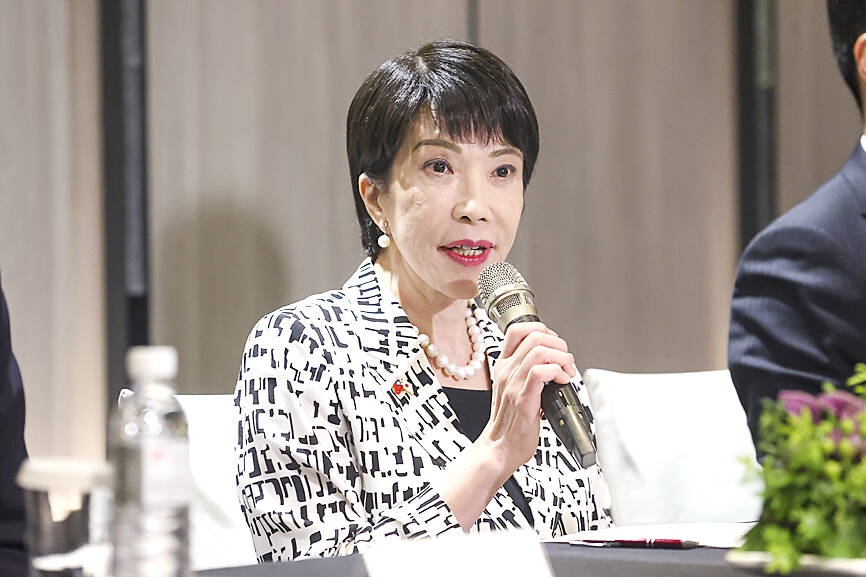A former Japanese minister who nearly won last year’s race to lead Japan’s ruling party yesterday called on Japan, Taiwan and other regional democratic partners to form a “quasi-security alliance” given the unpredictability of the US.
Speaking at a seminar in Taipei, Sanae Takaichi, a senior Japanese Diet member who most recently served as Japanese minister of state for economic security from 2022 to last year, said that many Japanese have a false belief that the US would unconditionally defend Japan based on the 1960 US-Japan Security Treaty.
Since US President Donald Trump returned to office earlier this year, Japanese have seen Trump make contradictory statements on the treaty on a daily basis, leading them to second-guess if the US would come to Japan’s aid when needed, Takaichi said, adding that she has always called on Japan to beef up its self-defense capabilities.

Photo: CNA
Taiwan and Japan are facing similar situations, and both need to strengthen their respective self-defense capabilities, she said.
One cannot rely on a single country alone for protection in the current global environment, and while each country is engaging in strengthening its own defense capabilities, like-minded allies should also join forces to face challenges, she said.
Taiwan, Japan, Europe, Australia and India and other countries upholding democratic values should form a “quasi-security alliance” to protect each other’s security and safety, she said.
She was referring to the fact that since taking office, Trump has complained several times about the US-Japan Security Treaty as “one-sided,” most recently earlier this month as both allies were about to engage in trade negotiations.
The treaty grants Washington the right to have bases on Japanese soil for US troops and commits it to come to the defense of Tokyo if it is attacked.
In addition to defense cooperation, Takaichi also called on Taiwan and Japan to jointly bolster their economic security, including by building strategic partnerships in the semiconductor supply chain and emerging technologies such as artificial intelligence.
Takaichi arrived in Taiwan on Sunday for a three-day visit, the Ministry of Foreign Affairs said.
Her delegation also includes Japanese House of Representatives members Hitoshi Kikawada and Masanao Ozaki, as well as House of Councilors member Kei Sato, it said.
The group earlier yesterday met with President William Lai (賴清德), Legislative Speaker Han Kuo-yu (韓國瑜), former president Tsai Ing-wen (蔡英文) and other Taiwanese lawmakers across party lines, Takaichi said.
Takaichi has been a member of the Japanese House of Representatives for the long-ruling Liberal Democratic Party (LDP) since 2005.
She was one of the frontrunners in the LDP’s presidential race last year, but she ultimately lost in a tense run-off to fellow Diet member Shigeru Ishiba, who became prime minister.

The disruption of 941 flights in and out of Taiwan due to China’s large-scale military exercises was no accident, but rather the result of a “quasi-blockade” used to simulate creating the air and sea routes needed for an amphibious landing, a military expert said. The disruptions occurred on Tuesday and lasted about 10 hours as China conducted live-fire drills in the Taiwan Strait. The Civil Aviation Administration (CAA) said the exercises affected 857 international flights and 84 domestic flights, affecting more than 100,000 travelers. Su Tzu-yun (蘇紫雲), a research fellow at the government-sponsored Institute for National Defense and Security Research, said the air

Taiwan is to commence mass production of the Tien Kung (天弓, “Sky Bow”) III, IV and V missiles by the second quarter of this year if the legislature approves the government’s NT$1.25 trillion (US$39.78 billion) special defense budget, an official said yesterday. Commenting on condition of anonymity, a defense official with knowledge of the matter said that the advanced systems are expected to provide crucial capabilities against ballistic and cruise missiles for the proposed “T-Dome,” an advanced, multi-layered air defense network. The Tien Kung III is an air defense missile with a maximum interception altitude of 35km. The Tien Kung IV and V

Trips for more than 100,000 international and domestic air travelers could be disrupted as China launches a military exercise around Taiwan today, Taiwan’s Civil Aviation Administration (CAA) said yesterday. The exercise could affect nearly 900 flights scheduled to enter the Taipei Flight Information Region (FIR) during the exercise window, it added. A notice issued by the Chinese Civil Aviation Administration showed there would be seven temporary zones around the Taiwan Strait which would be used for live-fire exercises, lasting from 8am to 6pm today. All aircraft are prohibited from entering during exercise, it says. Taipei FIR has 14 international air routes and

Taiwan lacks effective and cost-efficient armaments to intercept rockets, making the planned “T-Dome” interception system necessary, two experts said on Tuesday. The concerns were raised after China’s military fired two waves of rockets during live-fire drills around Taiwan on Tuesday, part of two-day exercises code-named “Justice Mission 2025.” The first wave involved 17 rockets launched at 9am from Pingtan in China’s Fujian Province, according to Lieutenant General Hsieh Jih-sheng (謝日升) of the Office of the Deputy Chief of the General Staff for Intelligence at the Ministry of National Defense. Those rockets landed 70 nautical miles (129.6km) northeast of Keelung without flying over Taiwan,